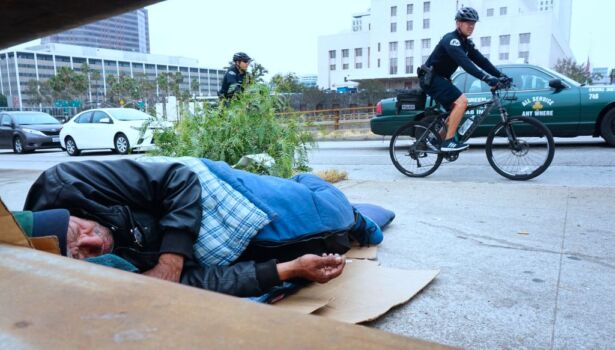As the Los Angeles Police Department (LAPD) grapples with understaffing and slow emergency response times, the city’s police union—the Los Angeles Police Protective League representing over 9,000 sworn personnel—submitted a list this week to the Los Angeles City Council of 28 non-emergency calls that it believes should be diverted to unarmed responders.
The list—which includes nonviolent homeless and mental health-related calls—will allow officers to prioritize and respond more swiftly to critical emergencies and higher profile crimes, the union said March 1 in a statement to the media, and allow nonprofit workers and other city agencies to respond instead. The outline was sent to the city as part of its labor contract negotiations.
Union spokesperson Tom Saggau told The Epoch Times it took several months to put the list together, and it was not a joint effort with the LAPD.
“Police officers are sent to too many calls that are better suited for unarmed service providers,” Craig Lally, the union’s president said in a statement to the media. “We believe that in order to maximize the potential benefits of this new response model, it’s important that the initial list of calls where police officers will cease responding to is robust.”
Other types of calls on the union’s list include issues such as parking violations, tenant disputes, dog complaints where no attack has occurred, illegal gambling, public defecation or urination, panhandling, calls to schools for nonviolent juvenile disturbances, welfare checks, nonviolent incidents at city parks, under the influence cases where no other crime is involved, public drinking, and cleanups of encampments.

Union director and former LAPD officer, Debbie Thomas said during a news conference March 1 that “police officers are not psychologists, we are not psychiatrists, we are not mental health experts.”
“We are not social workers, doctors, nurses or waste management experts,” she said.
LAPD Chief Michel Moore said in a statement to the Associated Press that alternative policing has “already diverted thousands of calls away from a police response,” allowing officers to conserve limited resources for more serious calls.
Moore began asking retired officers in January to consider returning to the force amid a staffing shortage. As of mid-February, the department is down by 233 officers, according to a department personnel report.
It currently has around 9,200 officers, but 600 are expected to leave in 2024, a 20 percent increase over 2022.
Change in Policing Already Underway
The union’s proposal aligns with the city’s recent consideration of alternative means of policing in several categories, particularly when dealing with the homeless and mentally ill.
Last October, the Los Angeles City Council voted to consider establishing the “Office of Unarmed Response and Safety” to deploy trained mental health workers to respond to nonviolent situations. The proposal was backed by Moore.
And the effort has reached the mayor’s office, too, as Los Angeles Mayor Karen Bass and the LAPD have recently agreed to collaborate on a list of nearly two dozen provisions, as reported earlier this week by The Epoch Times. The provisions are part of the mayor’s reform plans for the police department.
One of the items on that list calls for assessing alternative policing programs currently operating in the city and recommends 911 call operators to “triage calls requiring alternative response.”
Saggau said the union has “been calling for this for years.”
“I’m unsure why this is taking as long as it’s taking,” he said.
Other goals Bass wants the LAPD to implement are expanding its Mental Evaluation Unit and System-Wide Mental Assessment Team for a more rigorous response to mental health calls. The union has previously said the department has historically lacked support in these two bureaus.
“It is time to end the debate about sending unarmed responders to appropriate 911 calls,” Jerretta Sandoz, vice president of the police union said in a statement March 1. “Now is the time to roll up our sleeves and get to the hard work of implementing an alternative response model.”
Los Angeles is not the first to consider a shift to such.
New York City, San Francisco, Portland, and Olympia, Washington have also implemented or considered deploying unarmed response teams in recent years.
Dispatching mental health specialists instead of police officers to substance abuse and nonviolent emergencies in Denver showed a 34 percent reduction in low-level crime, according to a 2022 study published in Science Advances, a peer-reviewed research publisher.
From The Epoch Times
